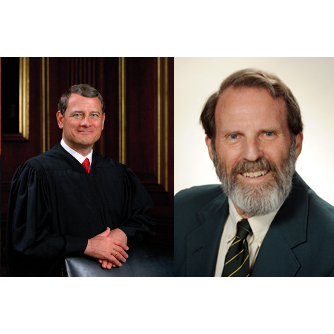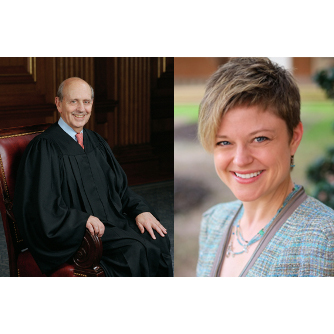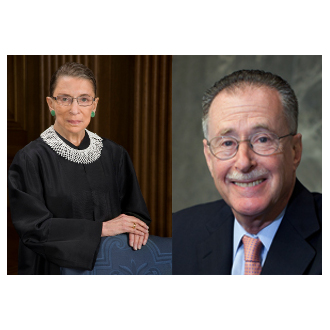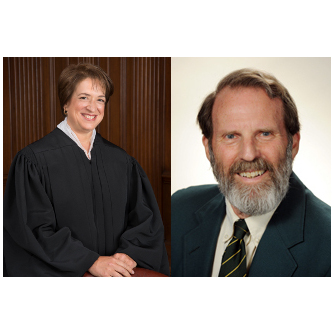Standing to Challenge Patents, Enforcement Risk, and Separation of Powers
Professor John F. Duffy 83 Geo. Wash. L. Rev. 628 Standing to challenge patent validity depends not only on factual assessments about the risk of patent enforcement, but also on legal judgments about the limits of judicial power under Article III of the Constitution, the specific causes of action granted by Congress through its Article... Read More
What Makes Lawyers Happy?: A Data-Driven Prescription to Redefine Professional Success
Professor Lawrence S. Krieger with Kennon M. Sheldon, Ph.D. 83 Geo. Wash. L. Rev. 554 This is the first theory-guided empirical research seeking to identify the correlates and contributors to the well-being and life satisfaction of lawyers. Data from several thousand lawyers in four states provide insights about diverse factors from law school and one’s... Read More
Integrating the Internet
Professors Bradley Allan Areheart and Michael Ashley Stein 83 Geo. Wash. L. Rev. 449 This Article argues that the paradigmatic right of people with disabilities “to live in the world” naturally encompasses the right “to live in the Internet.” It further argues that the Internet is rightly understood as a place of public accommodation under... Read More
Madisonian Tectonics: How Form Follows Function in Constitutional and Architectural Interpretation
Professor Jonathan Turley 83 Geo. Wash. L. Rev. 305 This Article is the first interdisciplinary work exploring architectural and constitutional theories of interpretation. This “conarchitectual” perspective is used to explore the concepts of form and function in both disciplines to better understand the meaning of structure. While form and function are often referenced in legal... Read More
Rethinking Standing in Patent Challenges
Professor Michael J. Burstein 83 Geo Wash. L. Rev. 498 Patents have become a serious business risk. They issue from the Patent and Trademark Office in record-breaking quantity and are aggressively enforced by patent trolls. But many patents are likely to be invalid; and even those which are valid are likely to be narrower than... Read More
Formalism and Distrust: Foreign Affairs Law in the Roberts Court
Professor Harlan Grant Cohen 83 Geo. Wash. L. Rev. 380 When it comes to foreign relations, the Roberts Court has trust issues. As far as the Court is concerned, everyone—the President, Congress, the lower courts, plaintiffs—has played hard and fast with the rules, taking advantage of the Court’s functionalist approaches to foreign affairs issues. This... Read More
Bullard v. Blue Hills Savings Bank
Response by Dean Alan B. Morrison Geo. Wash. L. Rev. Docket (Oct. Term 2014) Bullard v. Blue Hills Savings Bank, 575 U.S. ___ (2015). Docket No. 14-116; argued April 1, 2015; decided May 4, 2015 Slip Opinion | Oyez | SCOTUSblog The Supreme Court does not like interlocutory appeals, and it proved it once again in... Read More
ONEOK v. Learjet
Response by Professor Emily Hammond Geo. Wash. L. Rev. Docket (Oct. Term 2014) ONEOK, Inc. v. Learjet, Inc., 575 U.S. __ (2015) Docket No. 13-271; argued Jan 12, 2015; decided April 21, 2015 Slip Opinion | Oyez | SCOTUSblog Energy Law’s Jurisdictional Boundaries: A Call for Course CorrectionModern energy regulation grew from a jurisdictional hole:... Read More
Rodriguez v. United States
Response by Professor Stephen A. Saltzburg Geo. Wash. L. Rev. Docket (Oct. Term 2014) Rodriguez v. United States, 575 U.S. ___ (2015) Docket No. 13-9972; argued January 21, 2015; decided Apr 21, 2015 Slip Opinion | NY Times | SCOTUSblog Justice Ginsburg’s April 21, 2015 opinion for a six-Justice majority in Rodriguez v. United States1... Read More
United States v. Wong
Response by Dean Alan B. Morrison Geo. Wash. L. Rev. Docket (Oct. Term 2014) United States v. Wong, 575 U.S. ___ (2015) Docket No. 13-1074; argued December 10, 2014; decided Apr 22, 2015 Slip Opinion | Oyez | SCOTUSblog Equity Trumps JurisdictionThe question presented in United States v. Wong1 and its companion case,2 also from... Read More




